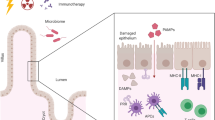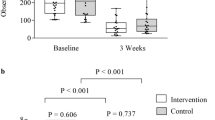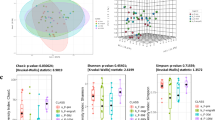Abstract
The intensive cytotoxic treatment given in connection with bone marrow transplantations induces severe injury to the gut consistent with an increase in intestinal permeability. Currently, extent of the gut injury is assessed by inspecting the mouth and recording symptoms deriving from the gastro-intestinal tract. The aims of this study were to evaluate whether changes in permeability correlate with clinical assessment of gut toxicity, according to the WHO criteria, and also to examine the duration of intestinal permeability after high-dose chemotherapy. In 18 consecutive patients undergoing bone marrow transplantation, gastro- intestinal permeability was assessed by a 51Cr-EDTA absorption test before the start of cytotoxic treatment, and 4, 7, 10 and 14 days after stem-cell infusion. In another seven patients, permeability was assessed 2 days after the start of cytotoxic treatment, and 1, 7 and 14 days after stem cell infusion. During the same period, oral- and non-oral clinical toxicity according to the WHO criteria were recorded. Permeability increased significantly 2 days after the start of cytotoxic treatment (P < 0.05), on day 1 (P < 0.05), on day 4 (P < 0.0005), on day 7 (P < 0.0005) and on day 10 (P < 0.005) after stem cell infusion, compared with pre-treatment permeability. despite significant barrier dysfunction, clinical toxicity was very moderate in the early transplantation course. gastro-intestinal, but not oral clinical toxicity requiring therapy, was consistent with a significant increase in permeability compared with no clinical toxicity or toxicity not requiring therapy. similarly, cumulative gastro-intestinal, but not oral toxicity correlated positively with the increase in permeability. the permeability test was unable to predict the severity of the clinical gastro-intestinal toxicity.
This is a preview of subscription content, access via your institution
Access options
Subscribe to this journal
Receive 12 print issues and online access
$259.00 per year
only $21.58 per issue
Buy this article
- Purchase on Springer Link
- Instant access to full article PDF
Prices may be subject to local taxes which are calculated during checkout
Similar content being viewed by others
Author information
Authors and Affiliations
Rights and permissions
About this article
Cite this article
Johansson, JE., Ekman, T. Gastro-intestinal toxicity related to bone marrow transplantation: disruption of the intestinal barrier precedes clinical findings. Bone Marrow Transplant 19, 921–925 (1997). https://doi.org/10.1038/sj.bmt.1700765
Received:
Accepted:
Issue Date:
DOI: https://doi.org/10.1038/sj.bmt.1700765
Keywords
This article is cited by
-
Nutrition support and clinical outcomes following allogeneic stem cell transplantation
Bone Marrow Transplantation (2023)
-
Gut protection by palifermin during autologous haematopoietic SCT
Bone Marrow Transplantation (2009)
-
Efficacy of glutamine-supplemented parenteral nutrition on short-term survival following allo-SCT: a randomized study
Bone Marrow Transplantation (2008)
-
Gut Toxicity During Hemopoietic Stem Cell Transplantation May Predict Acute Graft-Versus-Host Disease Severity in Patients
Digestive Diseases and Sciences (2007)
-
Intestinal mucosal dysfunction and infection during remission-induction therapy for acute myeloid leukaemia
Leukemia (2006)



